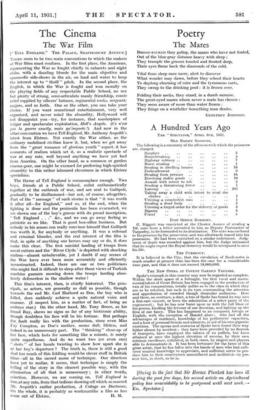The Cinema
The War Film
r TELL ENGLAND." THE PALACE, SHAFTESBURY AVENUE.] THERE seem to be two main conventions to which the makers of War films must conform. In the first place, the American, representing the War as fought chiefly in cabarets and night clubs, with a dazzling blonde for the main objective and spasmodic side-shows in the air, on land and water to keep the interest up to " thrill " pitch. In the second place, the English, in which the War is fought and won morally on the playing fields of any respectable Public School, no sex but plenty of strong, semi-articulate manly friendship, comic relief supplied by officers' batmen, regimental cooks, sergeant; majors, and so forth. One or the other, you can take your choice. If you want sensational entertainment, very well organized, and never mind the absurdity, Hollywood will not disappoint you—try, for instance, that masterpiece of vulgar and spectacular exploitation, Hell's Angels. (Ce n'est pas la guerre exactly, mats qu'importe !) And now in the other convention we have Tell England, Mr. Anthony Asquith's latest from Elstree. Not exactly the War either, as the ordinary mobilized civilian knew it, but, when we get away from the " great romance of glorious youth " aspect, it has moments of realism which set it, as a realistic spectacle of war at any rate, well beyond anything we have yet had from America. On the other hand, as a common or garden cinema-goer, one might be excused for preferring high-spirited absurdity to this rather laboured cleverness in which Elstree specializes.
The theme of Tell England is commonplace enough. Two boys, friends at a Public School, enlist enthusiastically together at the outbreak of war, and are sent to Gallipoli, gradually to be disillusioned—but not, of course, altogether. Part of the " message " of such stories is that " it was worth it after all—for England," and so, at the end, when the fighting is done and the peninsula has been evacuated, we are shown one of the boy's graves with its proud inscription,
Tell England . . ." &c., and we can go away feeling as patriotic as we like. That is good box-office business. But nobody in his senses can really convince himself that Gallipoli was worth it, for anybody or anything. It was a colossal and criminal blunder, and the real interest of the film is that, in spite of anything our heroes may say or do, it does make this clear. The first suicidal landing of troops from naval cutters and the ' River Clyde ' is depicted with shocking realism—almost unbelievable, yet I doubt if any scenes of the War have ever been more accurately and efficiently reconstructed. Indeed, there are one or two politicians who might find it difficult to sleep after those views of Turkish machine gunners mowing down the troops landing abso- lutely defenceless in the shallow water
This film's interest, then, is chiefly historical. The prin- cipals, as actors, are generally as dull as possible, though towards the end Mr. Carl Harbord as Doe, the boy who is killed, does suddenly achieve a quite natural voice and manner. (I suspect him, as a matter of fact, of being an embryo star.) On the other hand, Mr. Tony Bruce, as his friend Ray, shows no signs so far of any histrionic ability, though doubtless his face will be his fortune. But perhaps the, fault really lies with the production, since even Miss Pay Compton, as Doe's mother, seems dull, lifeless, and indeed in an unnecessary part. The "thinking" close-up of her face, which lasts for something like a minute, is surely quite superfluous. And do we want two (or even one) " shots " of her hands twisting to show how upset she is at her boy's departure ? The truth is, there is still a good deal too much of this fiddling would-be clever stuff in British films—all in the sacred name of technique. Our directors have yet to realize, it seems, that technique is simply the telling of the story in the clearest possible way, with the elimination of all that is unnecessary ; in other words, selection. However, we are coming on. Tell England is free, at any rate, from that tedious showing-off which so marred Mr. Asquith's earlier production, A Cottage on ,Dartmoor, On the whole, it is probably- as workmanlike a film as has










































 Previous page
Previous page